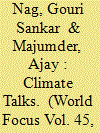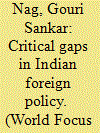| Srl | Item |
| 1 |
ID:
193433


|
|
|
|
|
| Summary/Abstract |
This article is an attempt to reflect on the CoP process of addressing the uphill task of climate change. So far, there have been 28 conferences on climate change under the aegis of the UN. The CoP28 held in Dubai has added new dimensions to the hermeneutics of climate change discourse. The authors have endeavoured to unravel the process of underlying politics of new policy making that is fraught with challenges amidst North South division, rampant geopolitical tensions and capitalism’s entry into the new age of information revolution. In this perspective aspects of Sino-Indian climate diplomacy have been discussed to bring out and understand their convergence and divergence.
|
|
|
|
|
|
|
|
|
|
|
|
|
|
|
|
| 2 |
ID:
148570


|
|
|
|
|
| Summary/Abstract |
Now a day it has become a fashion to ride on the bandwagon of neo-liberal line as we get to hear talks in which some neophytes project a kind of weltanschauung that ‘it’s time for us to get our business correct and the benefits would be as much ours as it would be for global corporate capital’. So it’s wisdom to put on corporate identity and India should configure her policies not only domestically but also need to reposition internationally. But if one deeply perceives, the lacuna in this logic would be amply clear. It’s because we cannot just get on simply with business hype when the quality of education and the resultant human resource in India are not simultaneously at par with the surging ambition. India spends very less for R&D. So, the next level of reforms cannot be neo-liberal, rather it ought to promote quality education for building quality man power, for neoliberalism only exposes us to compete but it does not enables to compete well. With this reference point what is being sought to suggest is a crucial need to shift our thinking towards addressing educational and skill exchange programme in our current foreign policy lexicon.
|
|
|
|
|
|
|
|
|
|
|
|
|
|
|
|
| 3 |
ID:
164930


|
|
|
|
|
| Summary/Abstract |
By democracy what we generally mean but which is not at all restricted to periodic elections or as Rounaq Jahan and Rehman Sobhan in their essay entitled Reconstructing Democracy in South Asia have aptly spelled out that ‘popular conceptions of democracy equate it with representative governance transacted through free and fair elections, in contrast to arbitrary rule exercised usually by the military or military-dominated regimes'.
|
|
|
|
|
|
|
|
|
|
|
|
|
|
|
|
| 4 |
ID:
167264


|
|
|
|
|
| Summary/Abstract |
India’s foreign policies were shaped to a large extent by developmental imperatives within the India’s democratic framework and by the international context of the Cold War barometer that continued to overheat as distant theatre as Asia. After a prolong era of protectionism, anti-globalization and halted globalization, globalization and deregulation began to uncork at the very moment when the Soviet Union collapsed.
|
|
|
|
|
|
|
|
|
|
|
|
|
|
|
|
| 5 |
ID:
161794


|
|
|
|
|
| Summary/Abstract |
The point at issue before the nation at large is how to approach illegal infiltration which is out to push the literati and thinking people in society towards a dangerous precipice of polarization with a staggering of infiltration pathology and psychosis on one hand and sort of prodigious humanitarian consideration on the other.
|
|
|
|
|
|
|
|
|
|
|
|
|
|
|
|
| 6 |
ID:
179596


|
|
|
|
|
| Summary/Abstract |
What makes us human beings? What makes us sovereign within ourselves? What gives value to our existence? What gives us the power to think and act? We believe without this capacity we will be reduced to just living beings. What is the factor that makes living beings into human beings? The immediate answer would be freedom. Freedom or liberty is the most important of all essential normative ingredients that make up the modern society.
|
|
|
|
|
|
|
|
|
|
|
|
|
|
|
|
| 7 |
ID:
160759


|
|
|
|
|
| Summary/Abstract |
At present India-Korea relationship has extended to a wide range in almost all dimensions – cultural, economic, security and strategic. The foundation for such an expanding relationship has been prepared through a durable legacy as their mutual synergy stem from convergence of interests.
|
|
|
|
|
|
|
|
|
|
|
|
|
|
|
|
| 8 |
ID:
141597


|
|
|
|
|
| Summary/Abstract |
In recent times under Prime Minister Narendra Modi’s stewardship we are witnessing changes that have tremendous importance from the perspective of India’s security and foreign policy. At the fag-end of August, Smt. Sushma Swaraj, Union Minister of External Affairs, had a three nation’s tour of Germany, Egypt and UAE. Egypt and UAE are reckoned as big brothers among the Muslim fraternity in the West and through them we can learn what they are thinking especially after the US-Iran Nuke deal. Modi himself visited UAE in August which has already won laurels from diplomatic circles at home and abroad. Taking cue from these, one might think of a possible strategic shift in India's foreign policy henceforth towards the West which means that India is trying to play a balancing role in the Middle-East compared to her hitherto intense engagements with the eastern states, often euphemistically paraphrased in diplomatic parlance as Look East Policy.
|
|
|
|
|
|
|
|
|
|
|
|
|
|
|
|